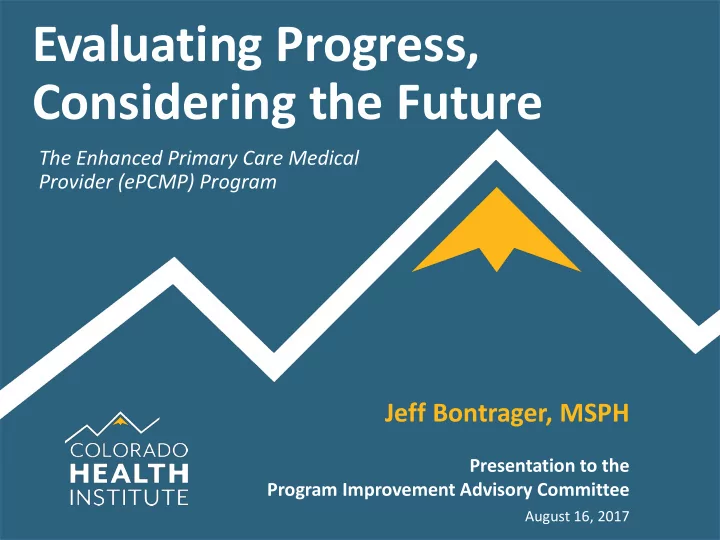

Evaluating Progress, Considering the Future The Enhanced Primary Care Medical Provider (ePCMP) Program Jeff Bontrager, MSPH Presentation to the Program Improvement Advisory Committee August 16, 2017
Background on the ePCMP Program Why? To recognize and reward PCMPs that implement additional medical home activities. How? Certified PCMPs receive a $.50 per-member per-month (PMPM) bonus in addition to standard $3.00 PMPM.
Methods CHI interviewed: • Seven RCCOs • Five HCPF Staff • Five Certified Practices • Four Non- Certified Practices
Overarching Finding • The ePCMP program has been highly effective at reinforcing medical home activities already underway. • The ePCMP program does not contain incentives strong enough to encourage primary care practices that are not engaged in these activities to invest the resources to begin doing them.
1. Which factors have the most potential and are most frequently implemented?
Which factors were most challenging to implement and why? Factors requiring significant investment of time and resources: • #4 - Behavioral Health Integration • #9 - Individual Care Plans
2. What lessons were learned from certifying providers as ePCMPs? RCCOs are essential. Three roles are particularly beneficial: • Outreach to practices, informing them of the program. • Coaching practices through the certification process. • Certification of practices as ePCMPs.
2. What lessons were learned from certifying providers as ePCMPs? • Most certified providers thought the process was easy because they had already implemented other medical home initiatives . • Those not certified cited lack of time to gather documentation or write new procedures.
3. In what ways can the ePCMP experience inform the remaining year of the program, as well as future evaluation efforts of the APM in Phase II? Recommendation #1 Develop a five-point tracking system to better understand the medical home activities of primary care practices.
Proposed ePCMP Scoring Approach Value Interpretation 1 No go. Practice is far from meeting this factor or has no interest in it. 2 A stretch. Practice is doing some of the required activities for the factor but would not meet the requirements without significant changes. 3 Almost there. Practice meets most of the requirements for the factor. Staff lacks time or resources to produce needed documentation. 4 Implemented but not submitted. Practice meets requirements, but this factor is not one of the five factors submitted to RCCO for certification. 5 One of the five. Practice meets requirements and this factor is one of the five submitted for ePCMP certification.
Recommendation #2 In ACC Phase II, employ best RCCO approaches to standardize the role of RAEs in certifying practices for the Alternative Payment Model (APM): • Using electronic media and in-person contact to reach out to practices • Having a single point of contact with the practice • Coaching primary care practices throughout certification
Recommendation #3 Pursue a two-tiered approach to evaluate the APM: Tier 1 – Understanding the Story Using Qualitative Methods Tier 2 – Analyze Program Data to Assess the APM’s Impact on Care and Outcomes
Three Takeaways • The ePCMP program is effective at reinforcing medical home activities already underway. The incentives aren’t strong enough to encourage practices to begin doing them, however. • Resources necessary to implement ePCMP factors vary. • Regional Care Collaborative Organizations (RCCOs) are crucial in promoting the ePCMP program and assisting practices in getting certified.
Discussion Questions • Do these findings resonate with your experience? • In what ways do you think the ePCMP experience can inform the evaluation of the APM?
Doing the right thing for the patient should be the right reason to do it. Practice Administrator Jeff Bontrager @CHI_Bontrager bontragerj@coloradohealthinstitute.org 720-382-7075
Recommend
More recommend